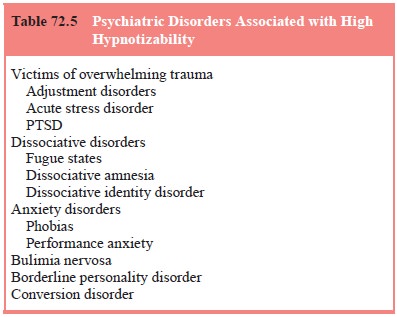Chapter: Essentials of Psychiatry: Hypnosis
Hypnotizability in Psychiatric Disorders
Hypnotizability
in Psychiatric Disorders
Charcot
described a relationship between conversion phenom-ena and hypnotizability. He
later incorrectly attributed both phenomena to a pathological process
afflicting the central nerv-ous system. Charcot believed that only sick or
hysterical people could be hypnotized. Others, including Bernheim, Janet and
Breuer, refuted the idea. They attributed the symptoms of con-version to
unconscious mechanisms and viewing hypnosis as a tool useful in both the
elicitation and removal of such states. Research in hypnosis has lately been
directed at understand-ing the relationship between hypnotizability and
psychiatric illness.
Some
psychiatric disorders are associated with high hyp-notizability scores (Table
72.5).
Several
psychiatric syndromes (schizophrenia, general-ized anxiety disorder, and to a
lesser extent major affective dis-order) (DSM-IV-TR) have been associated with
generally lower hypnotic responsiveness. It may be that the primary illness
process impairs the use of a patient’s natural capacity for hyp-notic
concentration. Because of this, hypnotizability testing can sometimes be used
to clarify diagnoses. As always, the presence or absence of hypnotic capacity
should be interpreted within the context of the presentation, medical and
psychiatric histories, and genetic background. In the case of an acute
psychosis in which there is no familial background, the presentation is later
in life than normal, there is a past history of physical or sexual abuse, and
the patient has a high hypnotizability score, a diag-nosis of hysterical
psychosis or a dissociative disorder should be strongly considered when the
possibility of schizophrenia is evaluated (Spiegel and Fink, 1979; Steingard
and Frankel, 1985).

Related Topics